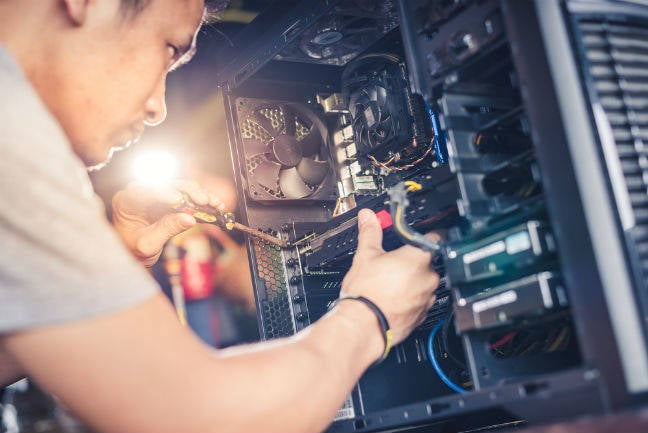Minnesota Governor OKs Broad Right-to-repair Tech Law

Minnesota Governor Tim Walz on Wednesday signed a bill that ensures the right-to-repair most electronic products in the US state.
The omnibus bill (SF 2774) signed into law contains a "digital fair repair" section that covers all digital electronic products, with the exception of motor vehicles, agricultural and construction equipment, video game consoles, advanced cyber security tools, home energy storage systems, and medical devices. (Agricultural? Oh, Deere.)
"It is the most comprehensive right to repair package yet passed, and fills in many of the loopholes that watered down the New York Right to Repair legislation," said Nathan Proctor, senior director of PIRG's Campaign for the Right to Repair, in a statement.
In an article published last year, Michael Carrier, a professor at Rutgers Law School, argued that the right to repair products is a critical concern for society.
"Users need to fix tractors, ventilators, military equipment, and technological devices," Carrier wrote. "With increasing frequency, however, they are not able to do so. Manufacturers have made it extremely difficult to repair products. They have made parts unavailable, prevented products from working, limited access to service manuals, and relied on intellectual property (IP), software restrictions, and licenses."
- Europe's right-to-repair law asks hardware makers for fixes for up to 10 years
- Right to repair shouldn't exist – not because it's wrong but because it's so obviously right
- Dual Tesla lawsuits pull Elon Musk into right-to-repair war
- John Deere signs right to repair agreement with US ag lobbyists
In 2020, a PIRG survey [PDF] of 222 biomedical repair professionals found that more than half of respondents said they would not be allowed to repair their ventilators if they broke due to manufacturer restrictions. And 30 percent said they had "equipment in their facilities which could not be used due to restrictions on spare parts and service information."
Being able to repair electronic products also reduces electronic waste, which is known to be harmful for the environment and for human health.
The Minnestora law addresses these concerns by requiring digital electronic equipment manufacturers to make documentation, parts, and tools, including embedded software, available to third-party repair ships or product owners on fair and reasonable terms, unless that material is no longer available to the original product maker itself.
Wide-ranging
According to Proctor, this is the first time Right to Repair has been extended to appliances, enterprise computing and commercial equipment like HVAC systems. The Minnesota law, which goes into effect on July 1, 2024 and applies to products made after July 1, 2021, also extends to mobile, tablets, and laptops like the New York law.
"This is a big deal for Minnesota consumers, and it creates momentum to extend these rights to people across the country," said Laurel Lehman, policy analyst for Consumer Reports, in a statement. "It’s the strongest, broadest right-to-repair law in the nation."
It creates momentum to extend these rights to people across the country
According to iFixIt, a repair advocacy group, the Minnesota law improves on the New York law by covering business-to-business and business-to-government sales, which means products like Chromebooks, file servers, and circuit boards are covered. It also does not require independent repair shops to post disclaimers about warranties, a practice that product makers support because it has the potential to deter customers from trusting third-party repairs.
Minnesota is the fourth state to approve a right-to-repair law, PIRG says, and the second to cover multiple industries. Colorado has adopted rules covering powered wheelchairs and farm equipment, while Massachusetts has focused on automobile repairs. And New York's law covers a more limited set of consumer electronics.
The Biden administration in 2021 called for "[making] it easier and cheaper to repair items you own by limiting manufacturers from barring self-repairs or third-party repairs of their products." While federal bills like the Fair Repair Act have yet to go anywhere, major consumer technology slingers – such as Apple and Microsoft – have made some concessions to product repairability.
The Right to Repair is an issue most Americans support, according to a Consumer Reports survey last year, and may soon become part of European law. ®
From Chip War To Cloud War: The Next Frontier In Global Tech Competition
The global chip war, characterized by intense competition among nations and corporations for supremacy in semiconductor ... Read more
The High Stakes Of Tech Regulation: Security Risks And Market Dynamics
The influence of tech giants in the global economy continues to grow, raising crucial questions about how to balance sec... Read more
The Tyranny Of Instagram Interiors: Why It's Time To Break Free From Algorithm-Driven Aesthetics
Instagram has become a dominant force in shaping interior design trends, offering a seemingly endless stream of inspirat... Read more
The Data Crunch In AI: Strategies For Sustainability
Exploring solutions to the imminent exhaustion of internet data for AI training.As the artificial intelligence (AI) indu... Read more
Google Abandons Four-Year Effort To Remove Cookies From Chrome Browser
After four years of dedicated effort, Google has decided to abandon its plan to remove third-party cookies from its Chro... Read more
LinkedIn Embraces AI And Gamification To Drive User Engagement And Revenue
In an effort to tackle slowing revenue growth and enhance user engagement, LinkedIn is turning to artificial intelligenc... Read more

